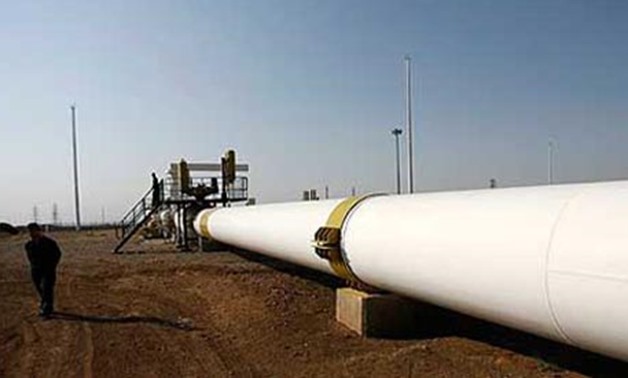
Egypt's natural gas pipelines - File photo/Reuters
CAIRO - 8 December 2022: Egypt aims to raise the volume of natural gas exports to $1 billion per month during 2023, according to the Minister of Finance, Mohamed Maait.
Maait elaborated during his speech on the sidelines of the "Euromoney Egypt 2022" conference, that the current gas exports amounts to $600 million per month.
“Egypt aims to raise the total volume of exports to $100 billion,” he stated, explaining that the exports in 2022 amounted to $32 billion, compared to $25 billion during 2021.
The minister said that the Egyptian economy has the ability to contain internal and external shocks, and to deal flexibly with their repercussions, due to the elaborate implementation of the comprehensive economic reform program, the hard work to achieve financial discipline, and the sustainability of growth in various sectors.
Maait said that the final account of the last fiscal year 2021/2022 embodies the success in maintaining the stability of financial performance indicators in light of the exceptional global economic conditions that witness the intertwining of the negative repercussions of the Corona pandemic with the war in Europe, which also affected the major economies of the world.
He added that the Egyptian government was able to reduce the total deficit of the state’s general budget to 6.1 percent of the gross domestic product, and to achieve a primary surplus of 1.3 percent during the last fiscal year ending in June 2022.
“We were also able to reduce the debt to 87.2 percent down from 103 percent in 2016; This illustrates the importance of the proactive measures taken by the government in dealing with the negative effects of the global economic crises,” he said.
The minister added that the state did not overlook its role in extending the umbrella of social protection, which expanded at an annual growth rate of 33.9 percent in spending on caring for and supporting the neediest and most vulnerable groups to reduce inflationary burdens on citizens.
He also made it clear that the Egyptian economy has become more capable of "green recovery" despite the harsh global challenges, as it has gained a degree of solidity that enables it to deal positively and flexibly with international crises, in a way that pushes the government to continue carrying out structural reforms with strong political will, to localize the industry and rely on local production. .
Maait pointed out that Egypt aims for more development investments, especially in green projects, including green hydrogen, by working hard to enable the local and foreign private sector to lead the locomotive of sustainable and job-rich economic growth, in order to provide one million job opportunities annually.
“The state ownership policy document was also launched, which opens new horizons through which we look forward to attracting foreign direct investments worth $10 billion annually over the next four years, in a way that contributes to achieving sustainable development, improving the standard of living of citizens and improving the services provided to them,” the minister pointed out.
The Minister of Finance noted that net foreign direct investment flows increased at the highest rate in 10 years, to about $8.9 billion, with a growth rate of 71.4 percent during the last fiscal year, compared to the previous fiscal year 2020-2021.
Maait stressed, in his speech, the importance of having a greater role for international development partners in providing concessional financing, especially in light of the expectations of the International Monetary Fund and the World Bank of a slow global economic growth.
He explained that the Egyptian government deals with the repercussions of the global economic crisis by relying on a balanced methodology between achieving financial discipline and expanding the umbrella of social protection for the neediest groups by raising the efficiency of public spending and rearranging priorities, pointing out that these efforts aim to contain shocks in a way that helps avoid acute economic risks and ensure the maintenance of a safe economic path for the state.
He pointed out that, in light of this, an exceptional package of about LE 135 billion was allocated, and an exceptional aid package began to be disbursed to 9.1 million vulnerable families for a period of 6 months.
The Minister of Finance also pointed out that the government is working to reduce the burden on citizens as much as possible, through social protection programs such as the Takaful and Karama (Solidarity and Dignity) program, which covers about 20 percent of citizens, in addition to improving the structure of wages and pensions, which contributes to reducing the unprecedented inflationary effects of the war in Europe.
Comments
Leave a Comment